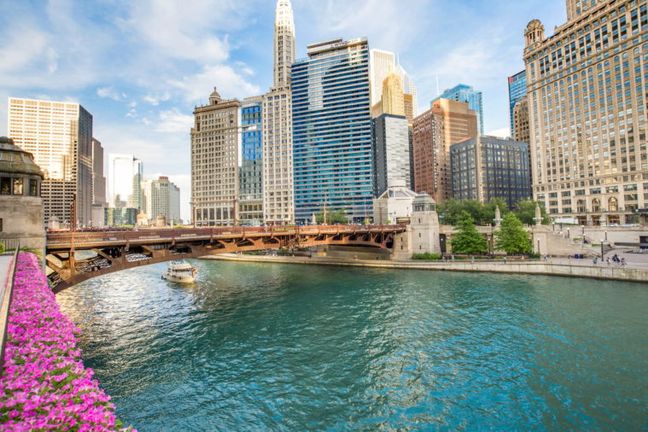Is the Illinois General Assembly’s 2021 amendment providing for prejudgment interest in personal injury and wrongful death cases in violation of the Illinois Constitution? On June 9, 2023, an Illinois First District Appellate Court issued a decision on the issue in Cotton v. Coccaro.[i] The court unanimously upheld the constitutionality of the amendments to 735 ILCS 5/2-1303(a).
The Amendment
This case analyzed the constitutionality of the Illinois General Assembly’s amendment to the Code of Civil Procedure. The 2021 amendment provides for prejudgment interest in personal injury or wrongful death resulting from or occasioned by the conduct of any other person or entity, whether by negligence, willful and wanton misconduct, intentional conduct, or strict liability of the other person or entity, permitting the plaintiff to recover prejudgment interest on all damages, except punitive damages, sanctions, statutory attorney’s fees, and statutory costs outlined in the judgment.
Previously, Illinois did not recognize the award of prejudgment interest in tort actions for personal injury or wrongful death. Instead, the judgment interest statute was limited to post-judgment interest in tort actions which accrued at the rate of nine percent per year after a court issued a judgment award.[ii]
Prior Challenges to the Statute
In Cook County, the Honorable Marcia Maras entered an order on May 27, 2022, ruling the amendments to 735 ILCS 5/2-1303 were unconstitutional and invalid.[iii] Thereafter, Judge James Flannery, Presiding Judge of the Law Division, entered an order consolidating all pending and subsequently filed motions and pleadings challenging the unconstitutionality of amendments to 735 ILCS 5/2-1303 with the Hyland matter before Judge Maras.
While the Cook County decision had only limited local effect, the Cotton opinion has statewide precedential effect, and is the law of Illinois unless or until another Illinois Appellate Court District or the Illinois Supreme Court issues a decision. To date, a petition for leave to appeal to the Illinois Supreme Court has not been filed.
- Background Facts of Cotton
In 2011, plaintiff filed a medical negligence action against several health providers, including Dr. Mitchell, Dr. Cansler, and Dr. Coccaro, in connection with their failure to diagnose her breast cancer. Dr. Mitchell and Dr. Cansler settled and were dismissed from the original action. Soon after, plaintiff voluntarily dismissed the suit without prejudice and refiled this medical negligence suit against medical personnel and professional entities involved in the breast imaging done at St. James Hospital. The case proceeded to a jury trial.
The jury returned a verdict in plaintiff’s favor and against Dr. Coccaro and Associated St. James Radiologists for the amount of $6,528,000. After entering a judgment on the verdict and denying plaintiff’s motion for prejudgment interest, the trial court modified the original judgment to include prejudgment interest. Taking into account the prior settlements in the amount of $1,758,482.73 and the addition of prejudgment interest of $111,332.29, the trial court entered a judgment in the amount of $4,880,849.56 against defendants. Defendants appealed.
- Analysis
The appellate court analyzed the relevant portions of the amendment and affirmed the trial court’s judgment, justifying the amendment’s constitutionality on the grounds that awarding prejudgment interest “…complements the compensatory purpose of civil law by ensuring that the plaintiff is compensated not just for the actual injury but also for the delay in being made whole.”[iv]
Despite a tortfeasor causing immediate injury to a tort victim, the tort victim is generally not recompensed immediately; tort victims often wait years before their legal claim is adjudicated and reduced to a judgment. Hence, providing an award of prejudgment interest to tort victims advances tort law’s goal: to place a tort victim in a position as near as possible to their original position prior to commission of the tort. Additionally, explains this court, awarding prejudgment interest to plaintiffs ensures a defendant is “…not unjustly enriched during that delay by retaining funds due to the plaintiff without cost…”[v] and that defendant bears the full cost of his conduct.
Finally, the court points out the amendment’s economic implications and its impact on the judicial system. Imposing prejudgment interest “…promotes efficiency in the processing of legal claims, because it reduces a defendant’s incentive to delay resolution of a case.”[vi] Not only does this delay burden the court system by increasing its caseload, but it also impacts the quality of evidence, as evidence can decay with time (witnesses die, forget, etc.). Without prejudgment interest, a defendant, says this court, “enjoys an interest free loan from the plaintiff until judgement.”[vii]
The court was not persuaded by the defendant’ arguments:
- The prejudgment interest amendment invades the jury’s province as the exclusive arbiter of factual issues and imposes a prohibitive cost on defendants’ exercise of their fundamental right to a jury trial;
- The prejudgment interest amendment permits double recovery for a single injury, depriving defendants of their property without due process of law;
- Awarding prejudgment interest to personal injury and wrongful death plaintiffs while excluding other tort victims violates the prohibition on special legislation in the Illinois Constitution;
- The prejudgment interest amendment violates the separation of powers, because it “deprives the judicial branch of its constitutional role where the factual question of damages is at issue”;[viii]
- The General Assembly violated the Illinois Constitution’s three-readings requirement;[ix]
- Even if the prejudgment interest amendment is not unconstitutional, it is unconstitutional to apply the amendment retroactively.
- Takeaways
The tone of the appellate court’s decision is plaintiff-friendly. An injured plaintiff is entitled to be made whole as soon as possible, and without the pressure of the imposition of prejudgment interest on top of a judgment award, the defendants are somehow motivated and will seek to delay the ultimate resolution of the case. The opinion offers no substantive bases or foundation for this position.
This amendment has the capability to greatly increase defendant’s financial exposure in actions involving personal injury or wrongful death. Subject to factors including (but not limited to) the complexity of the case and the number of parties, the full nature, extent, and duration of plaintiff’s damages may not be truly appreciated within this relatively short period of time. Pursuant to the amendment’s provisions, which require a defendant to make a settlement offer within the applicable twelve-month period in order to reduce or eliminate prejudgment interest, defendant’s early decision-making process will be impacted. Defense will have to consider not only if and when to make a settlement offer, but also the amount of the offer, as there are financial implications that may arise when valuing a reasonable settlement offer. As the court in Cotton suggests, upon the filing of a motion, a trial court may construe the statute to allow a full year (or at least a reasonable time) from the date a new party is added to make a qualifying written offer to avoid or reduce prejudgment interest.
This article updates the July 2, 2021, article It’s Official- Illinois Now Provides for Prejudgment Interest.
Mitchell Siegel co-authored and is a law clerk in Tyson & Mendes’ 2023 clerkship program.
Keep Reading
More by this author
Sources
[i] Cotton v. Coccaro, 2023 WL 3910582 (Ill.App. 1 Dist., 2023).
[ii] See 735 Ill. Comp. Stat Ann. 5/2-1303. The previous version of the law was effective from January 1, 2020 to June 30, 2021 and can still be found on Westlaw and other legal databases.
[iii] Hyland v. Advocate Health and Hospitals Corporation, et al., 2022 WL 16705676 (Ill. Cir. Ct., Cook County May 27, 2022)
[iv] Cotton v. Coccaro, 2023 WL 3910582, at *8 (Ill.App. 1 Dist., 2023).
[v] Id. at *9.
[vi] Id.
[vii] Id.
[viii] See Ill. Const.1970, art. II, § 1;
[ix] See Ill. Const. 1970, art. IV, § 8(d)

 Author: Mark Shanberg
Author: Mark Shanberg
 Editor: Ashley Paige Fetyko
Editor: Ashley Paige Fetyko
 Cannabis Workers Allege Quota to Trim 4 Pounds a Day Violates the California Labor Code
Cannabis Workers Allege Quota to Trim 4 Pounds a Day Violates the California Labor Code
 The Ninth Circuit Reminds Us: Every Word Matters
The Ninth Circuit Reminds Us: Every Word Matters
 NO WAY, PRO SE! The Consequences of Abusing the Judicial System as a Pro Se Litigant in Colorado
NO WAY, PRO SE! The Consequences of Abusing the Judicial System as a Pro Se Litigant in Colorado
 Victim of Financial Mismanagement or Unlawful Retaliation? New Jersey City University Program Founder Claims School Retaliated After Reporting Alleged Sexual Harassment
Victim of Financial Mismanagement or Unlawful Retaliation? New Jersey City University Program Founder Claims School Retaliated After Reporting Alleged Sexual Harassment
 “Real Housewives” Gets a Reality Check
“Real Housewives” Gets a Reality Check
 Missing a Chapter: Insufficiency of Expert Deposition Testimony in Medical Malpractice Litigation
Missing a Chapter: Insufficiency of Expert Deposition Testimony in Medical Malpractice Litigation
 Crash Course: Why Summary Judgment Misses the Mark in Illinois Multi-Cause Limousine Crash Collision
Crash Course: Why Summary Judgment Misses the Mark in Illinois Multi-Cause Limousine Crash Collision
 Bitter Truths: Lead, Cadmium, and Defective Pleadings in California Chocolate Class Action
Bitter Truths: Lead, Cadmium, and Defective Pleadings in California Chocolate Class Action
 The Law of Unintended Consequences: Including Insurance Brokers in Litigation Strategy Communication May Waive the Attorney-Client Privilege
The Law of Unintended Consequences: Including Insurance Brokers in Litigation Strategy Communication May Waive the Attorney-Client Privilege
 Good Faith Under the Contribution Act – Not Always Good for the Defense
Good Faith Under the Contribution Act – Not Always Good for the Defense
 Illinois Biometric Privacy Law Does Not Require Showing of Actual Injury
Illinois Biometric Privacy Law Does Not Require Showing of Actual Injury
 Time is on Their Side: If Illinois House Bill 3360 Becomes Law – Allowing Plaintiffs to Recover Pre-Judgment Interest
Time is on Their Side: If Illinois House Bill 3360 Becomes Law – Allowing Plaintiffs to Recover Pre-Judgment Interest
 Special Interrogatories in Illinois State Court are Now Weighted in Favor of Plaintiffs
Special Interrogatories in Illinois State Court are Now Weighted in Favor of Plaintiffs
 The Discovery and Use of Social Media Evidence in Illinois
The Discovery and Use of Social Media Evidence in Illinois